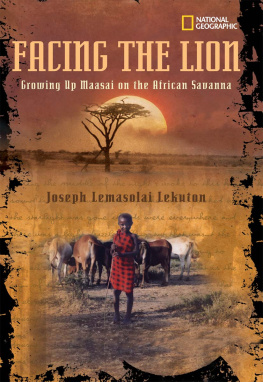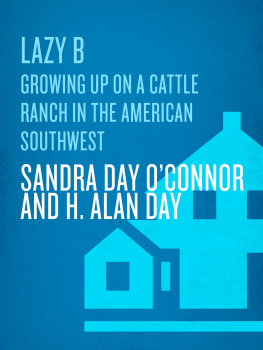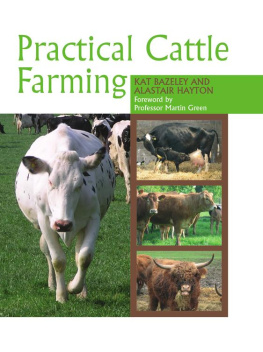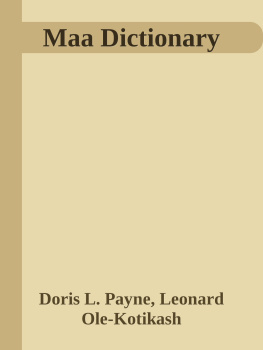These words are dedicated to my mother, Nkasiko.
Although unable to read or write, she gave me a priceless
education. And to my mothers in America, Bea, Ricki,
Jackie, Anne, Betty, and Kathleen, who reflected and
reinforced my mothers philosophy of life.
And to all the nomadic boys and girls
who have similar stories.
My story is theirs;
I just had the chance to tell mine.
Chapter One
A Lion Hunt
My sweet mother,
Dont call me a baby.
I stopped being a baby when I was initiated.
I M GOING TO TELL you the lion story.
Where I live in northern Kenya, the lion is a symbol of bravery and pride. Lions have a special presence. If you kill a lion, you are respected by everyone. Other warriors even make up songs about how brave you are. So it is every warriors dream to kill a lion at one point or another. Growing up, Id had a lot of interaction with wild animalselephants, rhinos, cape buffalo, hyenas. But at the time of this storywhen I was about 14Id never come face-to-face with a lion, ever. Id heard stories from all the young warriors who told me, Wow, you know yesterday we chased this lion bragging about it. And I always said, Big deal. Whats the big deal about a lion? Its just an animal. If I can defend myself against elephants or rhinos, I thought, why not a lion?
I WAS JUST BACK from school for vacation. It was December, and there was enough rain. It was green and beautiful everywhere. The cows were giving plenty of milk. In order to get them away from ticks, the cattle had been taken down to the lowlands. Theres good grass there, though its drier than in the high country, with some rocks here and there. There are no ticks, so you dont have to worry about the health of the cattle, but the area is known for its fierce lions. They roam freely there, as if they own the land.
I spent two days in the village with my mom, then my brother Ngoliong came home to have his hair braided and asked me to go to the cattle camp along with an elder who was on his way there. Id say the cattle camp was 18 to 24 miles away, depending on the route, through some rocky areas and a lot of shrubs. My spear was broken, so I left it at home. I carried a small stick and a small club. I wore my nanga , which is a red cloth, tied around my waist.
It took us all day to get there, but at sunset we were walking through the gap in the acacia-branch fence that surrounded our camp. There were several cattle camps scattered over a five-mile radius. At night we could see fires in the distance, so we knew that we were not alone. As soon as we got there my brother Lmatarion told us that two lions had been terrorizing the camps. But lions are smart. Like thieves, they go somewhere, they look, they take, but they dont go back to the same place again.
Well, that was our unlucky day. That evening when the cows got back from grazing, we had a lot of milk to drink, so we were well fed. We sat together around the fire and sang songssongs about our girlfriends, bravery songs. We swapped stories, and I told stories about school. The others were always curious to understand school. There were four families in the camp, but most of the older warriors were back at the village seeing their girlfriends and getting their hair braided. So there were only three experienced warriors who could fight a lion, plus the one elder who had come down with me. The rest of us were younger.
We went to bed around 11:30 or 12. We all slept out under the stars in the cattle campno bed, just a cowhide spread on bare soil. And at night it gets cold in those desert areas. For a cover I used the nanga that I had worn during the day. The piece of cloth barely covered my body, and I kept trying to make it longer and pull it close around me, but it wouldnt stretch. I curled myself underneath it trying to stay warm.
Everything was silent. The sky was clear. There was no sign of clouds. The fire was just out. The stars were like millions of diamonds in the sky. One by one everybody fell asleep. Although I was tired, I was the last to sleep. I was so excited about taking the cows out the following morning.
During the middle of the night, I woke to this huge soundlike rain, but not really like rain. I looked up. The starlight was gone, clouds were everywhere, and there was a drizzle falling. But that wasnt the sound. The sound was all of the cows starting to pee. All of them, in every direction. And that is the sign of a lion. A hyena doesnt make them do that. An elephant doesnt make them do that. A person doesnt. Only the lion. We knew right away that a lion was about to attack us.
The other warriors started making a lot of noise, and I got up with them, but I couldnt find my shoes. Id taken them off before I went to sleep, and now it was pitch black. Some warriors, when they know theres danger, sleep with their shoes in their hands and their spears right next to them. But I couldnt find my shoes, and I didnt even have a spear. Then the lion made just one noise: bhwuuuu! One huge roar. We started running toward the noise. Right then we heard a cow making a rasping, guttural sound, and we knew that the lion had her by the throat.
Cows were everywhere. They ran into one another and into us, too. We could hear noises from all directionspeople shouting, cows runningbut we couldnt see a thing. My brother heard the lion right next to him and threw his spear. He missed the lionand lucky for the rest of us, he missed us, too. Eventually, we began to get used to the darkness, but it was still difficult to tell a lion from a cow. My brother was the first to arrive where the cow had been killed.
The way we figured it was this: Two lions had attacked the camp. Lions are very intelligent. They had split up. One had stayed at the southern end of the camp where we were sleeping, while the other had gone to the northern end. The wind was blowing from south to north. The cows smelled the lion at the southern end and stampeded to the northtoward the other waiting lion.
When I asked my brother, Hey, whats going on? he said, The lion killed Ngoneya. Ngoneya was my mothers favorite cow and Ngoneyas family was the best one in the herd. My mother depended on her to produce more milk than any other cow. She loved Ngoneya, really. At night she would get up to pet her.
I was very angry. I said, I wish to see this lion right now. Hes going to see a man hes never seen before.
Just as we were talking, a second death cry came from the other end of the camp. Again we ran, but as we got closer, I told everyone to stop. Hes going to kill all the cows! I told my brother. And I think this is where school thinking comes in. I told him, Look. If we keep on chasing this lion, hes going to kill more and more. So why dont we let him eat what he has now, and tomorrow morning we will go hunting for him.






